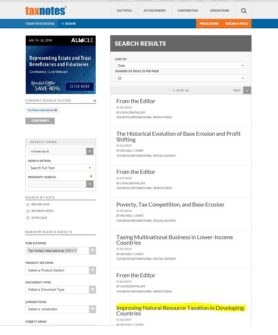Tax Notes International Special Reports
This paper explores the administrative challenges posed to developing countries as a result of the increasing emphasis in fiscal regimes for natural resource extraction since the Second World War on income-based taxes, including both corporate income and resource rent taxes, as opposed to royalties. The paper identifies both the political consequences and technical challenges (particularly in the area of enforcement of arm’s length pricing in the natural resource context). Politically, the paper argues that reduced reliance on royalties has clouded the imagery of natural resource taxation as a means of ensuring governments fair market compensation for the alienation of their non-renewable resource endowments, and instead has rendered natural resource taxation increasingly vulnerable to the political scepticism that has surrounded corporate income taxation in recent decades. The greater exposure of natural resource levies to this scepticism appears to have led to high levels of toleration of corporate tax avoidance by governments at all levels of economic development. From a technical perspective, the paper argues that income-based levies are intrinsically far more vulnerable to avoidance than royalties, posing substantial administrative challenges to those developing countries that wish to achieve high levels of tax compliance.
